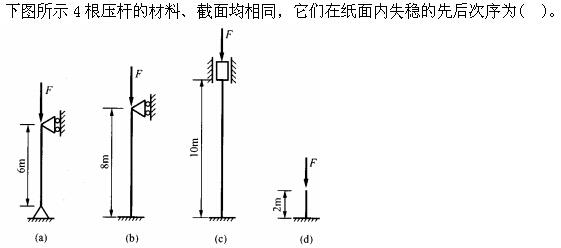[A] worship [B] reverence [C] admiration [D] gratitude
题目
[A] worship [B] reverence [C] admiration [D] gratitude
相似考题
参考答案和解析
本题考查名词词义辨析。空格所在部分为分词结构,作状语,即,indicating that... 。其中that引导宾语从句,空格处填入的名词为从句的主语。该名词后又跟有that引导的定语从句:that the peoples... goddess。将空格处的名词,即that代替的先行词放回定语从句,其完整结构是:the peoples of previous times had paid3 to the earth mother goddess。选项中四个名词为近义词,worship意为“崇拜,敬仰”;reverence意为“尊敬,崇敬”;admiration意为“钦佩,赞赏,羡慕”;gratitude“感谢”。从含义上看,人类对神应该是“崇拜”或“崇敬”,因此[A]和[B]比较恰当。其次,句中的搭配是pay sth. to sb.,表示“付出某事物给某人”。常用于这种搭配的是reverence及其同义词respect,pay reverence/respect to意为“尊敬,向……致敬”。因此本题应选[B]。
更多“[A] worship [B] reverence [C] admiration [D] gratitude ”相关问题
-
第1题:
 A.(a)、(b)、(c)、(d)
A.(a)、(b)、(c)、(d)
B.(d)、(a)、(b)、(c)
C.(c)、(d)、(a)、(b)
D.(b)、(c)、(d)、(a)答案:A解析:杆失稳与A有关,A越大,越容易失稳。 -
第2题:
下面用二元组表示的数据结构为线性结构的是 。
A.B=(D, R) D={a, b, c, d} R={<a, b>,<a, c>,<a, d>}
B.B=(D, R) D={a, b, c, d} R={<a, d>,<b, a>,<c, b>}
C.B=(D, R) D={a, b, c, d} R={<a, b>,<c, d>,<c, b>}
D.B=(D, R) D={a, b, c, d} R={<a, c>,<b, d>,<a, b>}
二叉树 -
第3题:
A、B、C、D为任意集合,以下正确的是
A.(A∪B)´(C∪D) = (A´C)∪(B´D)
B.(A-B)´(C-D) = (A´C)-(B´D)
C.(A∩B)´(C∩D) = (A´C)∩(B´D)
D.(AÅB)´(CÅD) = (A´C) Å (B´D)
A ´ (B∪C) = ( A ´ B)∪( A ´ C) -
第4题:
共用题干
第三篇
Valuing Childhood
The value of childhood is easily blurred(模糊)in today's world. Consider some recent
developments:The child-murderers in the Jonesboro,Ark.schoolyard shooting case were
convicted and sentenced.Two boys, 7 and 8,were charged in the murder of an 11-year-
old girl in Chicago.
Children who commit horrible crimes appear to act of their own will.Yet,as legal
proceedings in Jonesboro showed,the one boy who was able to address the court couldn't
begin to explain his acts,though he tried to apologize.There may have been a motive-
youthful jealousy and resentment.But a deeper question remains:Why did these boys and
others in similar trouble apparently lack any inner,moral restraint(束缚)?
That question echoes for the accused in Chicago,young as they are.They wanted the
girl's bicycle,a selfish impulse(冲动)common enough among kids.
Redemption(拯救)is a practical necessity.How can value be restored to young lives
distorted(扭曲)by acts of violence? The boys in Jonesboro and in Chicago will be confined
in institutions for a relatively short time,Despite horror at what was done,children are
not一cannot be一dealt with as adults,not if a people wants to consider itself civilized.
That's why politicians' cries for adult treatment of youthful criminals ultimately miss the point.
But the moral void(真空)that invites violence has many sources. Family instability(不
稳定)contributes. So does economic stress. That void , however. can be filled. The
work starts with parents,who have to ask themselves whether they're doing enough to give
their children a firm sense of right and wrong.Are they really monitoring their activities and
their developing processes of thought?
Schools,too,have a role in building character.So do youth organizations.So do law
enforcement agencies,which can do more to inform the young about laws,their meaning,
and their observance(遵守).The boys in Jonesboro and Chicago apparently lacked a sense of
A:right and wrong.
B:humor.
C:gratitude.
D:safety.答案:A解析: -
第5题:
3、A、B、C、D为任意集合,以下正确的是
A.(A∪B)´(C∪D) = (A´C)∪(B´D)
B.(A-B)´(C-D) = (A´C)-(B´D)
C.(A∩B)´(C∩D) = (A´C)∩(B´D)
D.(AÅB)´(CÅD) = (A´C) Å (B´D)
A ´ (B∪C) = ( A ´ B)∪( A ´ C)
